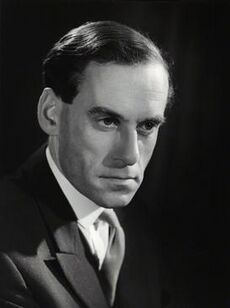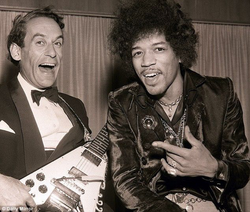Osvald Bjerg
Osvald Bjerg | |
|---|---|
 | |
| Minister of Foreign Affairs of Delkora | |
| In office 2 June 1975 – 6 June 1983 | |
| Monarch | Haldor VII |
| Chancellor | Geirbjørn Feldengaard |
| Preceded by | Mette Elvensar |
| Leader of the Liberal Party | |
| In office 26 June 1959 – 17 June 1983 | |
| Preceded by | Sofia Westergaard |
| Member of the Chamber of Representatives | |
| In office 12 August 1952 – 6 June 1983 | |
| Constituency | Cybria-North |
| Member of the Chamber of Nobles | |
| In office 1 July 1984 – 1 July 1992 | |
| Constituency | Cybria |
| Personal details | |
| Born | Osvald Ejvind Bjerg 2 February 1923 Tybenhoth, Cybria, Delkora |
| Died | 4 August 2014 Norenstal, Delkora |
| Nationality | Delkoran |
| Political party | Liberal |
| Spouse(s) | Katarine Bjerg (m. 1946) |
| Alma mater | Tybenhoth University (B.A.) University of Norenstal (M.L.) |
| Occupation | Diplomat Politician |
Osvald Ejvind Bjerg, Baron Bjerg of Tybenhoth (2 February 1923 – 4 August 2014) was a Delkoran statesman, diplomat, and politician who served as minister of foreign affairs of Delkora from 1975 to 1983. An ardent internationalist, he devoted considerable effort to strengthening relations with the Kingdom's allies and advocated a more proactive role for Delkora in world affairs. During his tenure, Delkora adopted a foreign policy of Principled Interventionism, which has continued to be the foundation of its international relations. He was a strong proponent of the Common Sphere, and is considered an important figure in its development.
Early life and education
Bjerg was born into a moderately wealthy family in Tybenhoth in 1923. His parents were both professors at Tybenhoth University. An introverted child, Bjerg mostly kept to himself as a child and struggled to make friends. His teachers described him as studious, noting that he preferred reading and writing over more physical pursuits. Afflicted by a severe stutter, he faced bullying from his classmates and spent much of his adolescent years in speech therapy.
Accepted into Tybenhoth University in 1940, Bjerg began studying history. It was around this time that he became politically active, joining the Young Liberals and campaigning for Liberal candidates for the Federal Parliament. In the context of the Liberal Party split of 1940, he supported Chancellor Sofia Westergaard and her Venstre faction, reflecting in his personal writings that he considered Julius Mathiesen to be a "blustering idiot" and a demagogue.
While at Tybenhoth, he began learning Italian, eventually becoming fluent. He was also active on both the speech and debate teams, honing his public speaking skills and winning a national debate competition in 1941. Upon Delkora's entrance into the Great War, Bjerg received a draft letter, but was excused from service after failing a physical health exam.
After graduating with honors from Tybenhoth in 1943, Bjerg began studying law at the University of Norenstal. He continued to be active with speech and debate, as well as Liberal Party politics. In the summer of 1946, he went to Svinia as part of a volunteer corp organized by the Ministry of Foreign Affairs to help with rebuilding in Eracura in the aftermath of the war. Bjerg would later reflect that his experience in the country affected him deeply and convinced him of the need for diplomacy and internationalism.
Diplomatic career
After graduating from the University of Norenstal in 1947, Bjerg accepted a position as a political officer at the Delkoran Embassy in Cacerta. In this position, he helped oversee political developments in the country in the early years following the dissolution of the Cacertian Empire. In 1950, he was relocated to the Delkoran Embassy in Quenmin.
Throughout his tenure as a diplomat, Bjerg was often frustrated by the foreign policy of Veidnar Albendor's government. He was critical of its failure to support democratic movements abroad and hold authoritarian regimes to account, and took particular issue with its stance on the Liberation War in Gylias.
Bjerg submitted these and other concerns to then minister of foreign affairs and future chancellor Hjalmar Madsen in a series of memos. After receiving no reply from Madsen, he tendered his resignation in early 1952 with a strongly-worded letter that read in part, "I cannot, in good conscience, continue to be associated with a government that so brazenly, and at every turn, stands in the way of oppressed peoples yearning for freedom."
Member of the Federal Parliament
After resigning from his post, Bjerg returned home to Tybenhoth and began contemplating standing for election to the Federal Parliament. Drawing upon his contacts in the Liberal Party leadership, he arranged a meeting with Sofia Westergaard, who was impressed by Bjerg's passion and intelligence. On Westergaard's recommendation, the Cybrian Liberal Party Central Committee voted to place him on the party's electoral list for his home constituency of Cybria-North. Bjerg was subsequently seated in the 1952 federal election.
As a member of the Chamber of Representatives, Bjerg served on the Committee on Foreign Affairs and the Ethics Committee. He was an outspoken opponent of the Albendor government's foreign policy, as well as its austerity policies. He consistently voted against upper class tax cuts, arguing that they were unsustainable and immoral.
Westergaard took the young MP under her wing early on, regarding him as a potential future leader in the party. In an effort to test his oratory skills, she arranged to give him ample opportunity to speak on behalf of the party in Parliament. Bjerg slowly gained a national profile throughout the 1950's with a series of impassioned speeches before the Chamber of Representatives. He proved to be invaluable during government questions.
After the assassination of Hjalmar Madsen in 1959, with riots occurring in the major cities as a result of a severe economic depression, Bjerg gave a famous speech in Parliament in which he warned that economic reforms were the only alternative to a violent uprising: "The question before us is not whether the reign of the rentier class will end, but whether it will end peacefully and democratically or with the streets running red with our blood."
Following 1959 federal election, Westergaard met with Bjerg and informed him she intended to step down as party leader and endorse him to be her successor. After some initial hesitancy, he agreed, and became leader later that month in an uncontested election.
Leader of the Liberal Party
Bjerg became party leader at a significant crossroads for the Liberals. Although they had lost seats to National Labor's landslide victory, they were firmly established on the centre-left. Bjerg's good working relationship with Chancellor Mette Elvensar reflected the cooperation between the two parties. The Liberals voted for key components of the New Kingdom reforms, helping them pass by large majorities.
Bjerg was considerably younger than other party leaders, and as telegenic as Elvensar. He was noted for his verve and wit in the Chamber of Representatives, and was seen as in touch with popular culture — famously being photographed with members of The Jimi Hendrix Experience in 1967. His radical positions could match those of National Labor, and his outspoken support of internationalism and diplomacy helped distinguish the Liberals, particularly in the foreign policy debates of the early 1960's, when the National Labor government largely maintained a stance of armed neutrality in international relations.
In 1965, in recognition of his foreign policy expertise and in an effort to maintain good relations between National Labor and the Liberals, Elvensar's government arranged for Bjerg to be made chair of the Foreign Affairs Committee. In this role, he proved to be an effective force in building parliamentary support for Delkoran membership in the Common Sphere, which was approved in a referendum that year.
Minister of foreign affairs
After the 1975 federal election ended National Labor's independent majority, Chancellor Geirbjørn Feldengaard met with Bjerg to ask his party to join a coalition government as junior partners. After a week of negotiations that mainly revolved around the allocation of cabinet posts, an agreement was reached and Bjerg was shortly thereafter sworn in as minister of foreign affairs.
As minister, he helped prepare the Foreign Policy White Paper of 1975, which defined the theory of "principled interventionism" that would guide Delkoran foreign policy going forward. In it, Bjerg defined this new policy as rejecting both "myopic isolationism" and "imperialist opportunism" in favor of "solidarity with the oppressed millions everywhere in the world fighting to establish a democratic government." Under the new doctrine, Delkora would provide political and economic support to democratic movements abroad, but would limit direct military intervention to cases of genocide and ethnic cleansing and would only intervene in the context of an international coalition.
Bjerg proved to be an energetic foreign minister, setting a record for most trips abroad during his tenure. As a result of his hatred of having to rely on translators, he learned French and Miranian while in office.
He had a particular interest in the Common Sphere, making regular visits to fellow memberstates Gylias, Cacerta, Akashi, and Lirinya. He developed a close friendship with Prime Minister Kasumi Kuroki of Akashi. Bjerg believed that the good functioning of the Common Sphere was essential to keeping Delkora independent from Ossorian and Acrean hegemony, and developed numerous proposals to strengthen the organization, many of which were implemented.
Later years and retirement
After the 1983 federal election produced a Conservative-Agrarian government, Bjerg announced his intention to resign as leader of the Liberals and step down from Parliament. As a recognition of his accomplishments as foreign minister, Chancellor Feldengaard ennobled him as Baron Bjerg of Tybenhoth prior to leaving office. The First Minister of Cybria subsequently nominated him for a seat in the Chamber of Nobles.
With the recent outbreak of the Refusal War in Syara, Bjerg gave a speech before the Chamber calling on Chancellor Lars af Vellarand to give diplomatic support to the Monarchists, warning that a Warden government would set back human rights in Syara.
Bjerg was a proponent of Delkoran political support for the Knichan government during the FedCom Civil War.
At the end of his eight year term in the Chamber of Nobles, Bjerg was offered a second term but declined. Even in retirement, he continued to be politically active, criticizing Chancellor Ulrik Andersen's policies, making frequent appearances at conferences and Liberal Party conventions, and publishing opinion pieces on foreign policy.
Bjerg died in 2014 after suffering a heart attack at his home in Norenstal.
Legacy
Bjerg is considered to be one of the most influential foreign ministers in Delkoran history, both in terms of his reshaping of Delkoran foreign policy and his contributions to the Common Sphere. He is often credited by scholars with successfully challenging Delkora's long tradition of isolationism both in government and public opinion, and his theory of Principled Interventionism continues to be the foundation of Delkora's foreign policy.
His public image and ability to connect with younger Delkorans as leader of the Liberal Party helped reinvigorate the party and kept it relevant even as it was eclipsed by the National Labor hegemony of the 1960's and early 70's.
In 2015, a bust of Bjerg was commissioned for the rotunda of the Federal Parliament.
